
Inglis Mill Site
Grey Co. | Ontario | Canada
Watersource: Sydenham River
Inglis Mill Site
Inglis Mill Site is located at Inglis Falls, on the Sydenham River, just south of Owens Sound. . Take 2nd Ave SE/Grey Road 5 south from Grey Road 6 in Owens Sound for 2.5 miles, turn left on Inglis Falls Road and go about 1.5 miles south. The entrance to Inglis Falls Conservation Area, on the left, is about ? mile north of Grey Road 18.
View Larger Map

A photo, from the front, of the 1845 mill built by Peter Inglis, a Scottish millwright who had bought the 300 acre property from W.C. Boyd, the salvager of the mill attempt of 1842.
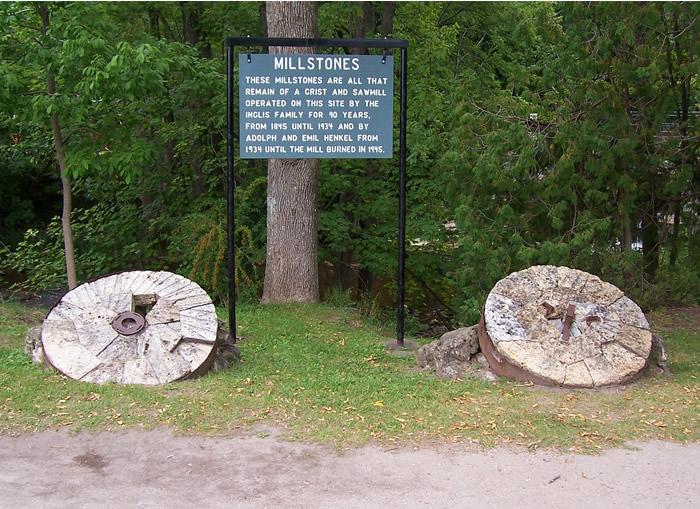
These are the millstones thast were used at the Inglis Mill. In 1912, a flood took out the old wooden dam and the Stark saw mill below the falls. The new concrete dam sent water 48 feet through the steel flume to the turbine of George Beattie, now the miller at Inglis Mill.
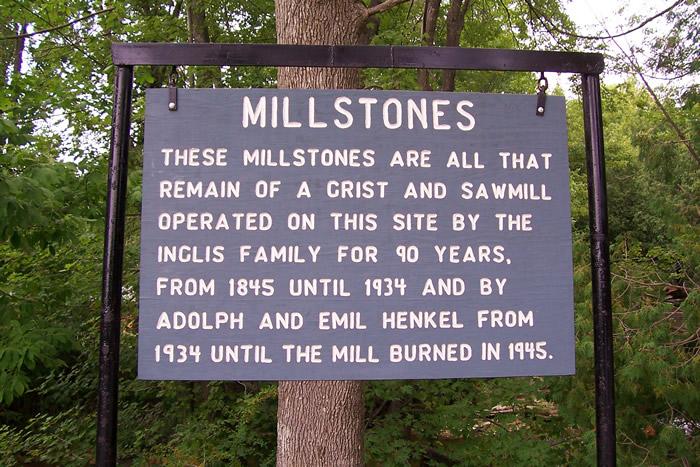
Victor & Louis Inglis continued on when William died in 1923. Millstone use was discontinued and new roller mills were installed by Goldie & McCulluch of Galt, Ontario. Production amounted to 100 barrels or 200 bags flour/day. After 87 years of continuous operation, the mill was sold to the City of Owen Sound in 1932 for water rights. A late surge of flouring ocurred in 1933, when Adolph & Emil Henkel ran the mill, selling their flour to National Grocers and Loblawe. the 1945 fire, during war time, pretty much sealed the mills fate. Building materials were needed for the war effort. Today, since 1960, the North Grey Region Conservation Authority maintains the area arround the falls and the mill site as an historic parkland under Grey Sauble Conservation Authority.
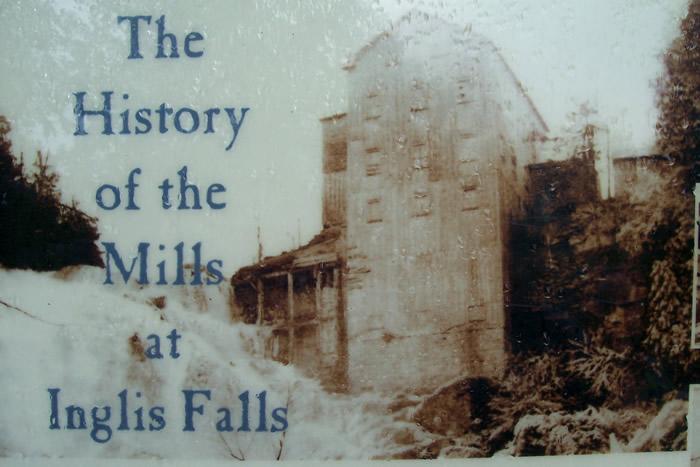
The mill, powered by Syndham River water, harnessed by a wooden dam, flume, and waterwheel. A sawmill was also built, across the river from the mill. Archibald Irvine was hired as the miller in 1851.
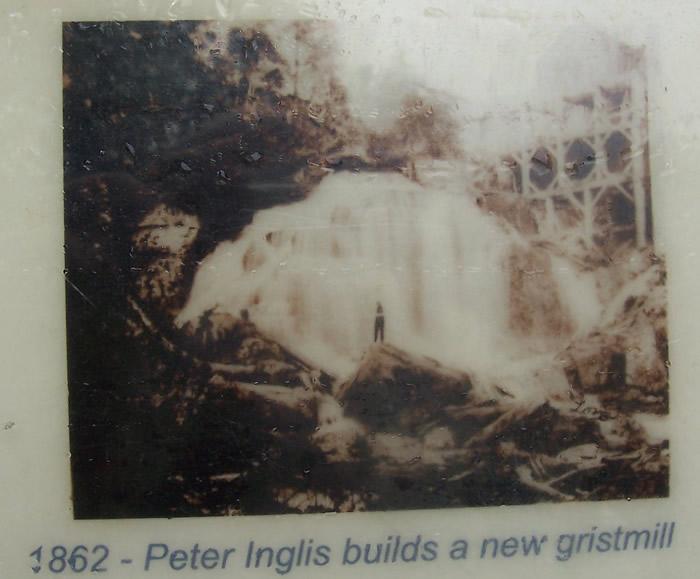
Thomas Dickinson was the new miller in 1856, with customers coming from as far away as Collingwood and Mount Forest by foot or oxen. Some coming the longer distances would bring their families and camp for a week or more.GPS: 44.526247, -80.934733
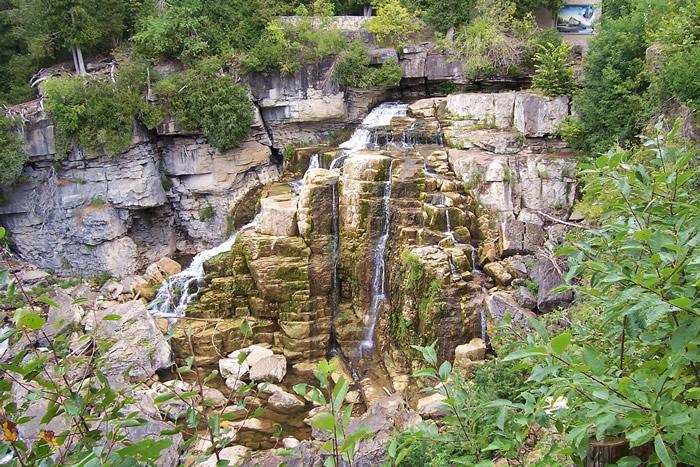
The present falls in early fall, waterfall at an absolute minimum. Inglis built a new 4 story mill in 1862, perched on the rocks at the top of the falls. Davis Wilson is now the miller and a new 2 story stone house for the Inglis family marked the scene. The saw mill was torn down in the 1870's and replaced with a woolen mill. Heverly & Chase rented the woolen mill, producing cloths, flannels, and blankets.
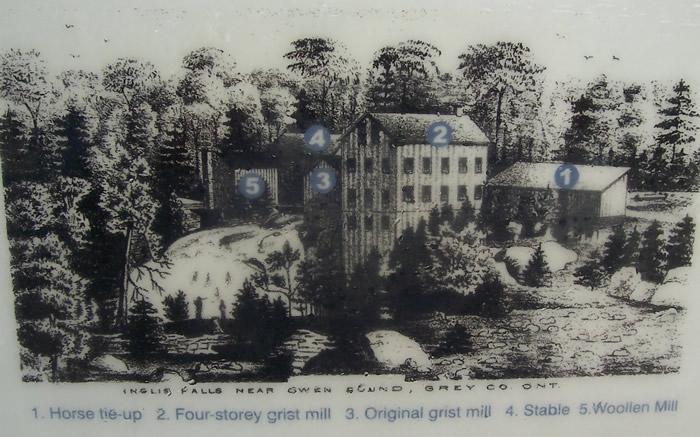
Charles Woodhead ran the woolen mill in 1881, then John Benner in 1883, producing "rainbow blankets", so named because of the three coloured stripes on the ends. This mill burned in 1885 and was rebuilt. William Inglis took over operation of the Cascade Roller Mills, W. A. Inglis & Sons, in 1886, Flours produced included: Lily White Flour, Five Lilies Bread Flour, King's Taste Pastry Flour, & Jubilee Cracked Wheat Flour. Inglis flour followed the troops to Europe in World War I.
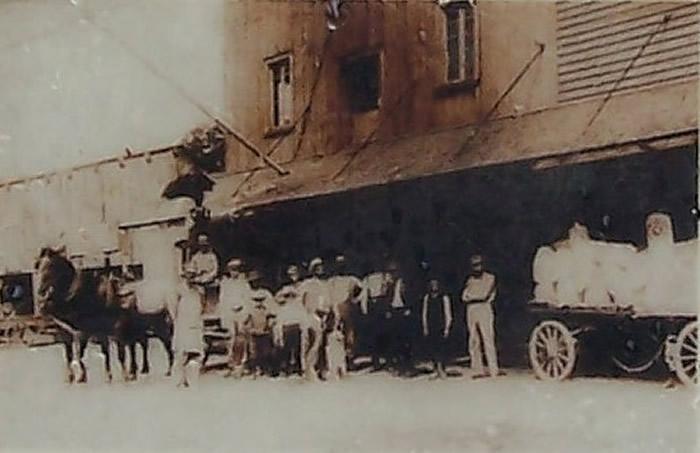
In 1901, the woolen mill burned a second time, not to be rebuilt. Starks Saw Mill, purchased by the Inglis family in the 1870's, about a quarter mile downstream of the falls, also ceased operations at this time as did Peter Inglis, passing from this world to the next.